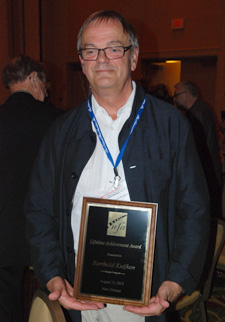Barthold Kuijken
2013 Lifetime Achievement Award
Belgian flutist Barthold Kuijken was born in 1949. He grew up in a musical environment and became increasingly interested in early music and early instruments. He studied modern flute at the Bruges Conservatory and the Royal Conservatories of Brussels and The Hague.
He began his early music studies playing the recorder, but found a high-quality original baroque flute that became his best teacher. Research on authentic instruments in museums and private collections, frequent collaboration with various flute and recorder makers, and assiduous study of 17th-, 18th-, and 19th-century sources helped him to specialize in the performance of early music on original instruments.
He also performed on a Böhm flute as a member of the Brussels-based ensemble Musiques Nouvelles, focusing on avant-garde music. Soon he started to play with his brothers, Wieland (viola da gamba and baroque cello) and Sigiswald (baroque violin and viola da gamba), with René Jacobs (countertenor), Paul Dombrecht (baroque oboe), Lucy van Dael (baroque violin), and harpsichordists Robert Kohnen and Gustav Leonhardt, and more recently with harpsichordists Bob van Asperen and Ewald Demeyere. For many years he was baroque flutist in the orchestra Collegium Aureum and, later, in La petite Bande, the baroque orchestra conducted by his brother Sigiswald. He plays concerts all over the world, extending his repertory to early 19th-century music (with fortepianists Luc Devos and Piet Kuijken) and occasionally to Debussy.

- Convention
- Scholarships & Competitions
- Resources & Publications
- Programs
-
Committees
- About Our Committees
-
Committee Webpages
- Career and Artistic Development Committee
- Flute Clubs Committee
- Global Flutes Committee
- Historical Flutes Committee
- Idea Committee
- Jazz Flute Committee
- Low Flutes Committee
- New Music Advisory Committee
- Pedagogy Committee
- Performance Health Care Committee
- Research Committee
- Special Publications Committee
- NFA Committees Blog
- Committee Web Presence Guidelines
- Giving
- About
- Community
- PayPal
- United States Armed Forces Ensemble